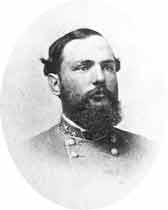|
 ooney, so nicknamed to distinguish him for his cousin and contemporary Fitzhugh Lee of "Clermont," Fairfax County, was the Lee's second son, born in 1837.
He was one of the liveliest and likable of the Lee children.
He was adventurous and as a child evoked his father's praise couched in jest.
Lee called him a “large heavy fellow” who needed a tight rein. When he was eight years old,
Rooney cut off his the tips of the forefinger and middle finger on his left hand while playing with a set of straw cutters. ooney, so nicknamed to distinguish him for his cousin and contemporary Fitzhugh Lee of "Clermont," Fairfax County, was the Lee's second son, born in 1837.
He was one of the liveliest and likable of the Lee children.
He was adventurous and as a child evoked his father's praise couched in jest.
Lee called him a “large heavy fellow” who needed a tight rein. When he was eight years old,
Rooney cut off his the tips of the forefinger and middle finger on his left hand while playing with a set of straw cutters.
Rooney's adventures during the 1850s kept him away from Arlington much of the time.
He entered Harvard in 1854, one of the three Virginians at the school.
At Harvard, he was popular and quickly fell in with Boston society.
He demonstrated his athletic prowess, pulling an oar on the Harvard crew.
He did not remain at Harvard to graduate, however. In 1857, with the aid of General Winfield Scott,
he secured a commission and fought in the campaign of 1858 against the Mormons. When the fighting was over,
however, he became bored and by 1859 had given up the army and married Charlotte Wickham.
Rooney and Charlotte settled down to farm the White House, the estate on the Pamunkey River in New Kent County,
Virginia he had inherited from his grandfather George Washington Parke Custis.
In 1861, Rooney joined the Confederate Army as a calvary officer under J.E.B. Stuart.
Perhaps having the most illustrious career of any of the three Lee sons,
Rooney was captured by Union troops at his wife's family home in June 1863,
while he was there nursing a thigh wound sustained at the Battle of Brandy Station.
He was taken to Fort Lafayette,
New York as a prisoner of war and spent eight months there before returning to the Confederate Army in an exchange.
He was promoted to major general and served until the end of the war.
After the war, Rooney returned to the White House estate.
From 1887 to his death, Lee was a Democratic Representative in Congress.
He must have been much impressed by the daily routine he had learned at Arlington when he was growing up.
For long after the Civil War, when the days at Arlington were dim memories,
he still maintained the old regimen of evening tea, prayers before breakfast and at bed time,
and Sunday evening hymn singing. Rooney Lee died in 1891.

|

